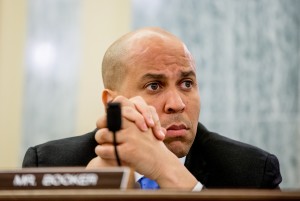Bill would partially shield criminal history during federal hiring process
The Fair Chance Act would stop federal employers and federal contractors from asking about criminal history information until the final stages of the hiring...
Daryl Lewis is one of 70 million people in America with a criminal history, and like many of his peers, he does not just want to exist outside of prison, he wants a life.
That desire is where congressional leaders are hoping to make a difference.
On Thursday, a group led by Sen. Cory Booker (D-N.J.) and Rep. Elijah Cummings (D-Md.) announced a bipartisan effort called the Fair Chance Act, which would block federal employers and contractors from asking about criminal history until the last stages of the hiring process for a candidate.
“This is a reflection of a growing movement that is about the common sense idea that when someone has paid their debt to society, we should be empowering them to rejoin society, not recidivating at the extraordinary levels that we’re seeing,” Booker said during a press conference at the U.S. Capitol. “The road to redemption is unfortunately filled with potholes, barriers and obstacles, and today we are doing something about it.”
The legislation would:
- Ban the federal government —including the executive, legislative and judicial branches —from requesting criminal history information from applicants until they reach the conditional offer stage.
- Prohibit federal contractors from requesting criminal history information from candidates within the scope of federal contracts until the conditional offer stage.
- Include important exceptions for positions related to law enforcement and national security duties, positions requiring access to classified information, and positions for which access to criminal history information is required by law.
- Require the Department of Labor, U.S. Census Bureau and Bureau of Justice Statistics to issue a report on the employment statistics of formerly incarcerated individuals.
“There will be those who will say well, can we take this chance?” said Rep. Darrell Issa (R-Calif.). “When 9 percent, or nearly one out of 10 Americans have a felony on their record, and [approximately] 25 percent have some other blemish or misdemeanor or some other background, can we not take a chance on a quarter of our population? Can we not take a chance on almost 10 percent of our population? We have to take a chance and the federal government will now be in a position to weigh those chances after they figure out whether or not somebody has earned the qualifications to get to that interview.”

Dressed in a crisp white shirt, gray slacks and sporting black thick-rimmed glasses, Lewis, 47, is a far cry from the man he was 25 years ago, out on the streets of western Baltimore and turning to a life of drug crimes. Lewis is about to graduate from a program with the Center for Urban Families, a Baltimore-based group that primarily helps families and black men live successful lives.
But Lewis, who attended Thursday’s announcement, is also still unemployed, thanks in large part, he says, to the negative connotations that go along with checking a box on an employment application.
“This bill will really, really support you being judged on the merits of who you are now, instead of what you’ve done before,” he said. “Because I’m nowhere near the person that I was 25 years ago, 13 years ago. I really believe when a person wants to get help, there should be opportunities for them to at least have the opportunity to seek help.”
“Once you get that criminal history, it’s like a life sentence,” Cummings said. “Think about what it’s like to start filling out an application and have your pen hover over that box that says ‘check here if you have a criminal history.’ It must feel like you have this past that you cannot seem to shake, no matter how hard you try. A criminal record reduces the likelihood of a callback or job offer by nearly 50 percent. That penalty increases to 60 percent when you’re looking at African American men. The Fair Chance Act helps give people with criminal records a chance to prove themselves on merits and fitness for a job.”
Eighteen states, both red and blue, have adopted some form of “ban the box” policy, Booker said, and he as well as his fellow congressional colleagues voiced their confidence in the support from both sides of the aisle for the Fair Chance Act.
As for Mr. Lewis, he said he’ll also be watching and hoping for a bipartisan effort to get the bill passed.
“The main thing I wanted to do was just get out [of prison],” Lewis said. “I wanted to be home. After being home my will to succeed far, far surpassed my will just to be out. I didn’t just want to do something to exist, I wanted to live.”
Copyright © 2025 Federal News Network. All rights reserved. This website is not intended for users located within the European Economic Area.






